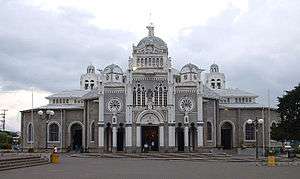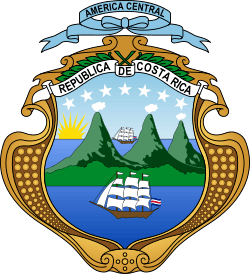Religion in Costa Rica
Religion in Costa Rica (Latinobarometro 2017)[1]

Roman Catholicism is the state religion of Costa Rica.
A nationwide survey of religion in Costa Rica, conducted in 2007 by the University of Costa Rica, found that 70.5% of the population identify themselves as Roman Catholics (with 44.9% practicing, 25.6 percent nonpracticing), 13.8% are Evangelical Protestants, 11.3% report that they do not have a religion, and 4.3% declare that they belong to another religion.[2]
Latinobarometro survey conducted in 2017 indicated a decline in the share of Catholics and rise in the share of Protestants and irreligious.[1]
Established religion
Roman Catholicism is the official state religion according to the 1949 Constitution, which at the same time guarantees freedom of religion. It is the only state in the Americas which established Roman Catholicism as its state religion; other such countries are microstates in Europe: Liechtenstein, Monaco, Vatican City and Malta.
Religious presence
While the Catholic church is still the largest church body, the Evangelical Protestants are growing rapidly, in 2013 representing 13.8% of the population. In Latin America, most Protestants are called Evangelicos. Some of the Protestant churches are [2] Methodist, Lutheran, Episcopal, Baptist, and other Protestant groups have significant membership.[2] The Church of Jesus Christ of Latter-day Saints (Mormons) claims more than 35,000 members and has a temple in San Jose that serves as a regional worship center for Costa Rica, Panama, Nicaragua, and Honduras.[2][3] Buddhism is the largest non-Christian religion with around 100,000 members, mostly amongst the Asian community, but with some converts.[4] There are also approximately 2,500 members of the Jewish faith. Jewish people have an important cultural and social input, and many ministers, deputies, and three Vice Presidents have been Jewish.[5]
Although they represent less than 1 percent of the population, Jehovah's Witnesses have a strong presence on the Caribbean coast.[2] Seventh-day Adventists operate a university that attracts students from throughout the Caribbean Basin.[2] The Unification Church maintains it's continental headquarters for Latin America in San Jose.[2]
Other religious groups, including followers of Islam, Taoism, Hare Krishna, Paganism, Wicca, Scientology, Tenrikyo, and the Bahá'í Faith, claim membership throughout the country, with the majority of worshipers residing in the Central Valley (the area of the capital).[2] While there is no general correlation between religion and ethnicity, indigenous peoples are more likely to practice animism than other religions.[2]
Freedom of religion
Article 75 of the Costa Rican Constitution states that the "Catholic, Apostolic, and Roman Religion is the official religion of the Republic."[6] That same article provides for freedom of religion, and the Government generally respects this right in practice.[2] The US government found no reports of societal abuses or discrimination based on religious belief or practice in 2007.[2]
See also
References
- 1 2 "Latinobarómetro 1995 - 2017: El Papa Francisco y la Religión en Chile y América Latina" (PDF) (in Spanish). January 2018. Retrieved 30 August 2018.
- 1 2 3 4 5 6 7 8 9 10 11 International Religious Freedom Report 2008: Costa Rica. United States Bureau of Democracy, Human Rights and Labor (September 14, 2007). This article incorporates text from this source, which is in the public domain.
- ↑ Costa Rica Archived 2010-08-25 at the Wayback Machine.. LDS Newsroom. Retrieved 2008-12-13.
- ↑ Buddhism in Costa Rica by Terrence Johnson, The Costa Rican News, August 5, 2012
- ↑ Perman, Stacy (December 2006). "The Jewish Traveler: Costa Rica". Hadassah Magazine. Retrieved 17 June 2017.
- ↑ "Costa Rica 1945 (rev. 2011)". Constitute. Retrieved 28 April 2015.
